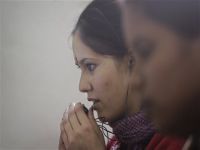Gender equality at the core of common values
As UN Secretary-General Ban Ki-Moon begins his tour of Mozambique, he places gender equality at the top of the list of requirements to achieve sustainable progress in terms of human development parameters. For this, the key words are education and awareness-raising.

Incredible as it may seem, in some areas of the world, up to seventy per cent of women will have experienced some form of violence or discrimination in their lifetimes; indeed gender violence and sexual harassment, the statistics show, is a global scourge which affects all continents and all societies, whether developing or already developed.
Ban Ki-Moon declares that "Violence against women and girls is a global pandemic," adding that "We must change attitudes and behavior." And the fact that in Mozambique up to half the female population is illiterate is the result of two factors: abandoning the socialist education system which made great strides in the country after its independence from Portugal in 1975 and the failure of the current market-based system to deliver acceptable public services.
If in parts of southern Africa ignorance runs so high that the act of raping a new-born baby girl is thought to offer protection against HIV/AIDS, then the blame must be laid squarely upon the shoulders of those who were supposed to have carried out public awareness campaigns and here, the buck stops at the feet not only of the national governments but also the UNO.
If this organization has failed to get the message across regarding AIDS, it has also failed, so far, to make meaningful inroads towards stopping gender violence and towards fostering sexual inclusion in societies where women have lost their status and are treated and regarded as objects.
It is here that the UNO, the main representative organization of our collective humanitarian values, must concentrate in establishing gender equality as the core at the centre of universal human values. This means inviolability of the person, which means an end to gender violence, it means an end to female genital mutilation, it means draconian laws against rape and sexual harassment, it means guaranteeing education from primary through to secondary level, at least.
It means inclusion of women in all areas of governance, at the regional, national, provincial and local level, it means total equality of rights for women at work, it means the right to become pregnant and deliver a child, mother and look after a child within the world of work as a birthright rather than being considered as a burden.
It means an end to sexist practices in choosing hierarchies and in hiring staff: "If you do join this company, what are your plans regarding having a family?" Or, "You aren't thinking of becoming pregnant, ARE you?!!"
The implementation does not run by reams of paper in the form of UN reports, the implementation comes in the shape of a well-designed, culturally and sexually inclusive, flexible education programme which runs for twelve years starting at year one of primary school and going through to the end of secondary school.
The answer is not blowing in the wind, the answer is perfectly simple to formulate and easy to implement.
Timothy Bancroft-Hinchey
Pravda.Ru
Subscribe to Pravda.Ru Telegram channel, Facebook, RSS!


